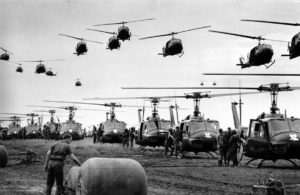“The Vietnam War” is coming to a close this week. I refer, of course, to the landmark public television series, not the actual war.
What are the takeaways from this epic production directed by Ken Burns and Lynn Novick and broadcast on PBS? I have so many of them, but I think I’ll focus briefly here on just one of them.
It is that the Vietnam War required us to redefine victory.
We fought the communists in Vietnam for more than a decade. We killed many more of the enemy than we lost so very tragically. We emerged victorious from many more battlefield encounters than the Viet Cong or the North Vietnamese. As we have learned in the Burns-Novick epic, U.S. commanding Gen. William Westmoreland was obsessed with “body count”; he insisted that the media report that the enemy suffered far worse than our side did.
Merrill McPeak, a fighter pilot during the Vietnam War who later became Air Force chief of staff, noted correctly in the documentary that the United States dropped more ordnance on the enemy than we did in all the combat theaters of World War II. Think of that for a moment. American air power dropped more explosive tonnage on the Vietnam communists than we did against the Nazis, the Italians and the Japanese.
What we didn’t do and the reason we “lost” the war was because we lost our political will. The Vietnamese were fighting on their turf, defending their homeland, battling an enemy they considered to be “invaders.” They had more to lose — and to gain — than we ever did. Thus, it was their fight to win.
Are there lessons to carry forward as we continue to fight an even more elusive enemy, those terrorist organizations that have declared “death to America!”? Yes, certainly.
One profound lesson should be for U.S. politicians — or one in particular — to cease implying that defeating an enemy is “easy.”
We cannot just keep dropping bombs and sending young Americans into cities, killing enemy fighters and then expect the enemy simply to give up. We tried that in Vietnam. It didn’t work out well for us.
Ken Burns and Lynn Novick have provided a masterful piece of documentary television. Just as Vietnam was the first war to be fought “in our living rooms,” my hope is that the educational benefit that’s being delivered to us via PBS will assuage some of the pain we felt as the fighting raged.
***
Politico has provided a fascinating look at a conversation involving President Lyndon Johnson and U.S. Sen. Richard Russell. The Burns-Novick documentary doesn’t report on it.
Take a look at the story here.
